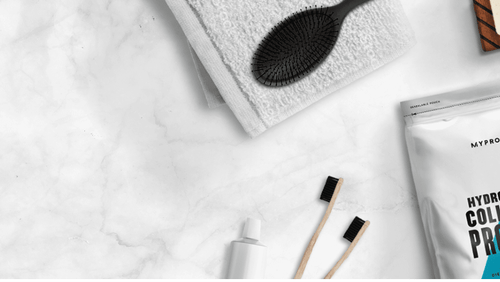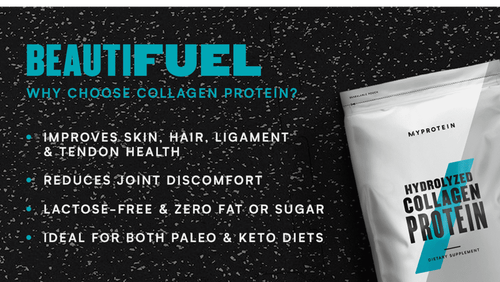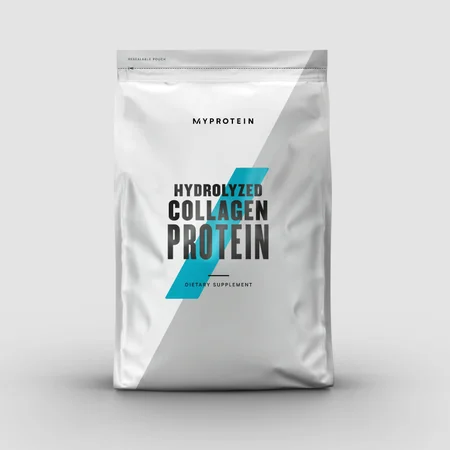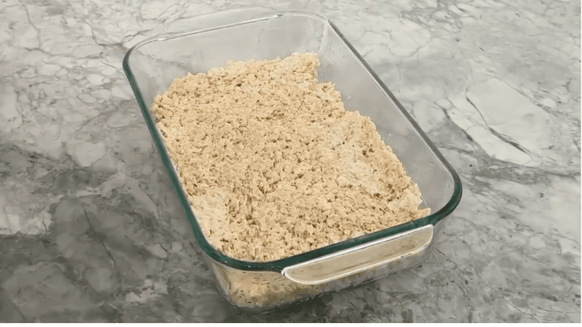Collagen Protein | 5 Amazing Benefits of Collagen

Most people know about the benefits of post-workout protein, but did you know that collagen protein powder was up there with whey and soy?
Collagen is the most abundant protein in our bodies, making up 25-35% of our body’s total protein content.1 It has many benefits that other types of protein powders may not have, and is something the body already makes on its own. In this article we’ll examine the top five benefits of collagen protein powder as a supplement and the best ways to use it to maximize your results.
What is collagen protein?
Collagen protein is the major structural component of our body’s connective tissues. It also exists between cells to support body tissues and assist with cell function.1 Collagen is produced by the body, notably by skin cells, which has led to the marketing of collagen supplements to improve skin’s youthfulness and slow the aging process.2

Practically, this means that collagen’s main function is to help our body’s tissues stay flexible but firm and withstand stretching.1 Since flexibility and healthy joints are crucial for meeting our exercise goals, maximizing our body’s collagen usage can also help to keep our joints healthy.1
One type of collagen protein has been available for use in cooking for many years under the name “gelatin”. Often, gelatin is produced from the bones and skin of cows and pigs, and forms a gel-like substance when added to liquid.3 It has traditionally been used as a thickener in puddings and other dessert foods. However, culinary gelatin was not typically sold as a protein supplement and only used in small amounts due to its lack of versatility.
Like all proteins, collagen is made up of amino acid building blocks. Most collagen protein powders are hydrolyzed, or broken down in to their amino acid components to enable them to be easily digested and absorbed by the body.3
Taking purified, hydrolyzed collagen powder tricks your body into thinking it needs to produce more collagen of its own. When your body detects these building blocks of collagen, it thinks that collagen has been broken down, and that our need for collagen is greater — prompting our cells to produce more collagen.2
What are the benefits of collagen protein?
Collagen protein is a structural powerhouse that benefits our bodies in 5 key areas: our muscles, our skin (also hair and nails), our digestive system, and our joints. All of these body systems are important for overall health, as well as maximizing the impact of our workouts. While some of these benefits are well known, others might come as surprise. Here are some of the ways that collagen might help you.

1. Muscle Growth and Repair
One primary benefit of any protein powder is muscle growth and repair. Like other sources of protein in our diet, combined with exercise, collagen protein powder can help build and strengthen our muscles.4
One particular study showed three major impacts from collagen supplements after exercise — increased muscle strength, muscle mass, and decreased fat mass.4 This particular study was conducted in an elderly population, showing the benefits of collagen even as we are aging. However, the benefit of muscle growth and repair is useful for everyone from elite athletes to occasional gym goers. This change in body composition (more muscle and less fat) can also contribute to weight loss over time.4
2. Skin Health
Just like the gelatin form of collagen, collagen has been shown to improve skin health. One study in particular saw a measurable improvement in skin wrinkles after 8 weeks of consistent supplementation.5 It also showed an increase in procollagen and elastin protein levels in the participants who took the supplement consistently.5
This study illustrates that although your body can produce its own collagen, we can see greater effects of its benefits when you take it as a supplement.5 Another study showed the benefit of collagen supplements on skin hydration and prevention of sun-related skin damage and aging.6 In addition to skin benefits, collagen is also associated with healthier, stronger skin and nails.2
3. Digestion
Because collagen is a structural protein, it plays a crucial role in keeping the digestive tract strong. The digestive tract works like a large muscle to digest food and extract the nutrients our bodies need. While direct research on collagen protein powder supplements and digestion is limited, there’s a link between low levels of blood collagen and inflammatory bowel disease (IBD).7
Because the digestive system is such a crucial part of the immune system, it’s important to keep the digestive barrier strong and healthy. Collagen is naturally high in the amino acid glycine, which is known to improve digestion.9
4. Weight Loss
It’s well documented that higher protein diets help to decrease appetite to prevent over-eating which can lead to weight loss.10 Collagen is a high-protein supplement that acts in this way to help you feel fuller and more satisfied. Protein actually slows the digestive process, keeping food in your stomach longer, which sends signals to your brain that you are full. Staying fuller and more satisfied between meals can help prevent overeating and lead to weight loss.
The previously mentioned study that proved increased muscle mass and decreased fat mass with collagen supplements also can lead to weight loss through this change in body composition.4 Because lean body mass (muscle) burns more calories than fat mass, increasing lean body mass means you’ll burn more calories in the long term.
The reduction of fat mass from taking a collagen supplement consistently could improve overall body composition, which is also associated with weight loss.4 Collagen is sourced from animals, not milk, so it’s low in carbs and compatible with keto diets as well, and means it’s suitable for those with a lactose intolerance.

What are the side effects of collagen protein?
An in-depth review of collagen as a supplement has shown that it’s low-risk for any type of side effects.12 The fact that collagen is a naturally-occurring protein that’s already so abundant in our bodies makes it unlikely to cause side effects.
While whey- and soy proteins pose the risk of food allergies for some, collagen protein doesn’t have either of those major allergen sources present. Collagen is typically sourced from cow, pig, or fish but varies by product. Check the label if you are curious about the origin of your collagen supplement.
What is the best collagen protein supplement?
While side effects are limited, some types of collagen protein supplements are more beneficial than others. Although collagen is well known for its impact on skin health, it’s more useful to ingest collagen in the form of a powder or pill supplement than to apply it topically to the skin.
Collagen is commonly available in a powdered form (collagen hydrolysate), which can be added to a variety of foods and beverages, from coffee to your post workout smoothie. Collagen supplements are also available as pills and in pre-packaged beverage forms. Bone broths are another popular way to consume collagen, which you can make on your own or purchase in a grocery or health food store.
Take home message
Collagen is a natural source of protein that can benefit our bodies in many ways. Traditionally available as gelatin, it has been used in cooking and associated with benefits like healthier skin and nails. Collagen protein powder is a convenient, versatile form of collagen that can easily be added to your pre- or post-workout shake.
Not only can it help with muscle growth and repair, but collagen also shows benefits to joint health, digestion, and weight loss. With limited side effects, collagen protein powder is an excellent choice to add to your supplement regime.
Want to learn more about collagen protein? Check these out next.

Collagen Protein and MCT Oil | The Perfect Keto Combo
Thinking of starting a keto diet? These supplements will help you get started.

Introducing: Hydrolyzed Collagen Protein — Fuel Your Health and Beauty Ambitions
Our newest innovation and anti-aging hero.

Claire is a Registered Dietitian through the Academy of Nutrition and Dietetics and a board-certified Health and Wellness Coach through the International Consortium for Health and Wellness Coaching. She has a Bachelor of Science in Biology and a Master’s degree in Clinical Dietetics and Nutrition from the University of Pittsburgh.
Talking and writing about food and fitness is at the heart of Claire’s ethos as she loves to use her experience to help others meet their health and wellness goals.
Claire is also a certified indoor cycling instructor and loves the mental and physical boost she gets from regular runs and yoga classes. When she’s not keeping fit herself, she’s cheering on her hometown’s sports teams in Pittsburgh, or cooking for her family in the kitchen.
Find out more about Claire’s experience here.
- Lodish, H., Berk, A., Zipursky, S. L., Matsudaira, P., Baltimore, D., & Darnell, J. (2000). Collagen: the fibrous proteins of the matrix. Molecular cell biology, 4.
- Borumand, M., & Sibilla, S. (2014). Daily consumption of the collagen supplement Pure Gold Collagen® reduces visible signs of aging. Clinical interventions in aging, 9, 1747.
- Gómez-Guillén, M. C., Giménez, B., López-Caballero, M. A., & Montero, M. P. (2011). Functional and bioactive properties of collagen and gelatin from alternative sources: A review. Food hydrocolloids, 25(8), 1813-1827.
- Zdzieblik, D., Oesser, S., Baumstark, M. W., Gollhofer, A., & König, D. (2015). Collagen peptide supplementation in combination with resistance training improves body composition and increases muscle strength in elderly sarcopenic men: a randomised controlled trial. British Journal of Nutrition, 114(8), 1237-1245.
- Proksch, E., Schunck, M., Zague, V., Segger, D., Degwert, J., & Oesser, S. (2014). Oral intake of specific bioactive collagen peptides reduces skin wrinkles and increases dermal matrix synthesis. Skin pharmacology and physiology, 27(3), 113-119.
- Tanaka, M., Koyama, Y. I., & Nomura, Y. (2009). Effects of collagen peptide ingestion on UV-B-induced skin damage. Bioscience, biotechnology, and biochemistry, 73(4), 930-932.
- Koutroubakis, I. E., Petinaki, E., Dimoulios, P., Vardas, E., Roussomoustakaki, M., Maniatis, A. N., & Kouroumalis, E. A. (2003). Serum laminin and collagen IV in inflammatory bowel disease. Journal of clinical pathology, 56(11), 817-820.
- Fasano, A. (2012). Leaky gut and autoimmune diseases. Clinical reviews in allergy & immunology, 42(1), 71-78.
- Razak, M. A., Begum, P. S., Viswanath, B., & Rajagopal, S. (2017). Multifarious beneficial effect of nonessential amino acid, glycine: a review. Oxidative medicine and cellular longevity, 2017.
- Leidy, H. J., Clifton, P. M., Astrup, A., Wycherley, T. P., Westerterp-Plantenga, M. S., Luscombe-Marsh, N. D., … & Mattes, R. D. (2015). The role of protein in weight loss and maintenance. The American journal of clinical nutrition, 101(6), 1320S-1329S.
- Shaw, G., Lee-Barthel, A., Ross, M. L., Wang, B., & Baar, K. (2016). Vitamin C–enriched gelatin supplementation before intermittent activity augments collagen synthesis. The American journal of clinical nutrition, 105(1), 136-143.
- Maughan, R. J., Burke, L. M., Dvorak, J., Larson-Meyer, D. E., Peeling, P., Phillips, S. M., … & Meeusen, R. (2018). IOC consensus statement: dietary supplements and the high-performance athlete. International journal of sport nutrition and exercise metabolism, 28(2), 104-125.








